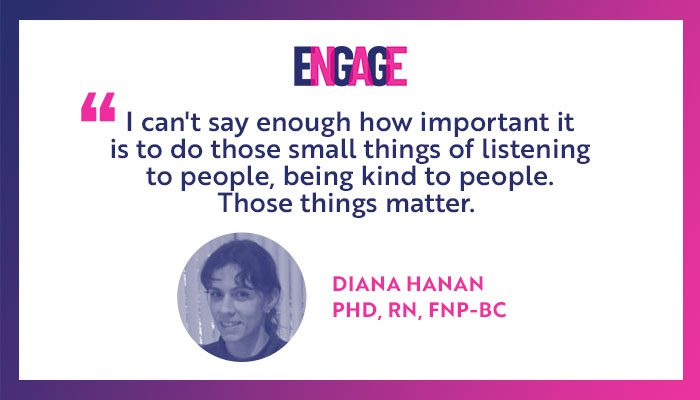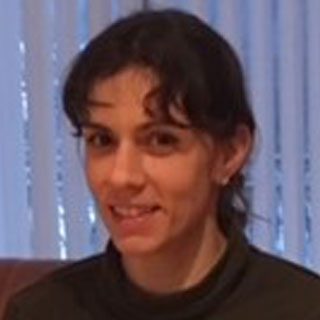
Interview with Diana Hanan PhD, RN, FNP-BC
Aug 25, 2022Diana is a Family Nurse Practitioner and Assistant Professor in the School of Nursing at Simmons University. As an RN, she worked in psychiatric settings, treating patients with mood disorders, eating disorders, and psychosis. As a nurse practitioner, she has worked in long-term care settings with older adults with dementia and mental illness. Her clinical and research interests focus on how to improve care for older adults with serious mental illness, particularly individuals in long-term care. She is also a member of the Human Rights Committee of Bay Cove Human Services.
Diana joined the Engage Initiative stakeholder board in 2020. She is part of the Clinical and Recovery Work Group that focuses on developing and sharing best practices to improve care for individuals affected by mental illness and cancer.
Tell us more about the Clinical and Recovery Workgroup
I love working with people who understand the importance of spreading the message that we all play a part in advocating for mental health. In a small group that includes nursing, psychiatry, oncology, and navigation, we have so much to talk about, and we enjoy hearing each other’s ideas. That sense of community and shared passion has been exciting.
Our workgroup is developing a communication training for interdisciplinary clinicians and providers. It can be challenging to start a difficult conversation, like the words to say, “you might not be getting better” or, “we need to talk about maybe worst-case scenario and how we’re going to manage together.” Clinicians might be uncomfortable or unknowingly use language that is offensive to some people especially if they don’t have mental health training. With input from peers, patients, caregivers, and clinicians, we are creating guides to help clinicians build trust and tailor communication with patients with mental illness and cancer. For example- instead of referring to somebody as a “schizophrenic,” you would say “a person with schizophrenia” because somebody is not their illness. I think this is so important because our words impact how people feel and can make or break trust with clinicians and patients. (*To learn more, please visit ToolkitforDigitalEquity.html)
What inspired you to join the mental health field?
When I was growing up, and it’s still the case, there was so much stigma around mental illness, and people didn’t talk about it because it was considered shameful. Somebody in my family had a serious mental illness when I was a child. I didn’t understand it. I was bullied for it and teased about having a family member who was ill. It was scary and also very sad visiting my family member in the hospital and seeing individuals who were affected. I could see something was wrong that they couldn’t help. I know that most people with mental illness are not dangerous — they’re just sick.
I didn’t think that I would go into healthcare, but I found myself drawn to individuals with mental illness. I worked as a patient liaison in an emergency room after college and thought I would go to medical school, but had a change of heart. Instead, I went to nursing school. On my psychiatric nursing rotation, something clicked. I felt at home. I felt a bond with the patients and with the other nurses on the unit. We all really cared, and we sort of understood our patients as people who are just as good as everyone else, who were not dangerous, who were not bad. They were just sick and their illness led them to perceive reality in a different way. We just had to be there for them and meet them where they were.
What do you wish you could change about the mental health field?
One thing that I find frustrating, in medicine and in nursing, is siloing – so we have medical care over here and psychiatric care over here, and they are viewed as completely separate. I think that does a disservice to so many people, because everybody has medical needs and many individuals also have mental health needs. To keep somebody healthy, you have to address both. Unfortunately, we have providers trained to give primary care and not psychiatric care, or mental health care but not cancer care. Or maybe they’re trained, but they’re not comfortable. There is a tendency to put psychiatry and mental health in a whole other dimension and it’s not — it’s part of humanity. People get sick; people can get tonsillitis, people can get depression. I know it’s not exactly the same thing, but I think that we need to view them as the same thing – one’s not more important than another. You can’t put mental illness in a box and say, I’m not trained for that. That’s not my thing. I’m not comfortable. If you’re not comfortable, then you need to get comfortable.
What can we all do to help this change?
This change needs to happen from within: healthcare providers and educators need to spread the message that mental health is just another part of health, another part of medicine, it’s something we all do. We need better mental health training for all providers. I teach nursing and one thing I try to tell my students is, “you’re not all going to go into psychiatric nursing and that’s fine, but you’re all going to learn it because you’re all going to use it.” You may be on a med/surg floor with a patient with appendicitis, but maybe that patient has an eating disorder and her caregiver has severe anxiety. As a nurse, you can’t opt out, but you don’t have to be an expert. If you work in healthcare, it’s everybody’s job.
We can model how to talk about mental health respectfully-not just in clinical care, but at workshops with peers, with friends, and with family. Especially because there is so much stigma and misunderstanding, when we casually throw out stereotypes, assumptions, or jargon-that can increase shame and prevent people from asking for help or going to mental health treatment. (*To learn more about person-centered language, please view page 4 ToolkitforDigitalEquity.html)
Do you have hope that mental health will become more coordinated with medical care?
With COVID, we hear so much about individuals experiencing mental health needs. As a teacher and a clinician, I’ve seen it – people with depression, anxiety, grief. So many lives were lost due to COVID: my coworkers lost a lot of patients, I lost a lot of patients. With all of this, there’s more awareness. More workplaces and schools are talking about mental health — trying to make people more comfortable with the idea that, “Hey, look, there are resources” and normalize using those resources and seeking mental health care. I think more healthcare systems are recognizing that gap, so I have hope that eventually the mental health field will be more connected to medical care.
What was a meaningful moment in your career?
I was working as a floor nurse on a psychiatric unit. I was having a really bad day and didn’t want to be there. It was late and I hadn’t gotten any charting done. One of my patients said, “I need a medication, I need a PRN.” I remember thinking, “You couldn’t have asked me 10 minutes ago when I was in the med room?”, but instead I said, “Okay, just give me a minute, I’ll be right there.” So going to the med room, I’m thinking about how much the day sucked, how miserable I am and I’m pulling the med out. Then, suddenly he says, “You know, you’re one of my favorites.” And I went, “Huh?” And he said, “you’re one of my favorite nurses.” I was so startled. I just said, “Oh.” And he said, “You’re always nice to me.” And I said, “Well, people should be nice to you.” He said, “Yeah, but you don’t have to be and you always are.” It was such a reminder for me that no matter what I’m coming into work with, no matter what I’m carrying around with me, my actions impact people. I need to be aware of that. It reminded me how important it is just to be nice, you know, to think about the way you talk to people and take care of people — these things matter.
What advice would you give to someone with mental illness or a caregiver of someone who has mental illness?
Coming from my experience of having gone through it, treating other people with it, being a family member of somebody— you know yourself and understand yourself better than anybody. Don’t let other people’s ideas about what you are, who you are, what kind of illness you have, don’t let that define you. You’re more than that.
One big assumption people have is those who are mentally ill are not capable and can’t do good things in life. It’s important to know that there’s always hope — there’s hope for recovery, and maybe that’s not total recovery, maybe you’ll live with your illness forever, but that doesn’t mean that you can’t have good days. And that doesn’t mean you can’t have a good life and show up for yourself and be there for others. Everybody has value. Everybody has something to give.
For family members and caregivers- it can be so hard and isolating when you’re going through this. You feel alone. Remember you’re not alone. There are so many people and caregivers not talking about their experience with mental illness who may feel afraid or ashamed. There is help and there’s nothing wrong with asking for it. (*for caregiver resource groups, please visit https://www.nami.org/Support-Education/Support-Groups/NAMI-Family-Support-Group)
Closing words?
I’ve received the message over the years that I wasn’t going to accomplish much, that I shouldn’t really expect a good life for myself, and that did a lot of damage and hurt me. I haven’t done everything I want in life, but things are pretty good right now. The answers don’t always come from the experts; sometimes the answers come from the people who just take the time to stop and listen to you and get to know you. I can’t say enough how important it is to do those small things of listening to people, being kind to people. Those things matter.

Dr. Diana Hanan PhD, RN, FNP-BC
Diana is a Family Nurse Practitioner and Assistant Professor in the School of Nursing at Simmons University. As an RN, she worked in psychiatric settings, treating patients with mood disorders, eating disorders, and psychosis.
Sign Up for Our
Quarterly Newsletter!
Join the Engage Initiative
to learn more about upcoming
events, stay up-to-date on
all of our efforts, and
help us bridge the divide!









